Autism spectrum disorder is a developmental disorder that affects a person’s behavior and communication with the outside world.
Autism spectrum disorder is a developmental disorder that affects how a person acts and interacts with the world around them. Autism spectrum disorder begins in early childhood but sometimes, in more mild forms, is not diagnosed until a child goes to school for the first time. It is a spectrum disorder due to the broad range in level of impairments. While some individuals with autism are high-functioning and can lead relatively normal lives, there are many people with autism who never speak and are never able to care for themselves.
What Is Autism Spectrum Disorder?
So, precisely what is autism spectrum disorder? Autism spectrum disorder, often referred to as autism, primarily affects a person’s behavior and their communication with the outside world. Autism is a neurodevelopmental disorder, meaning it affects the functioning and development of the nervous system and, in the case of autism, the brain.
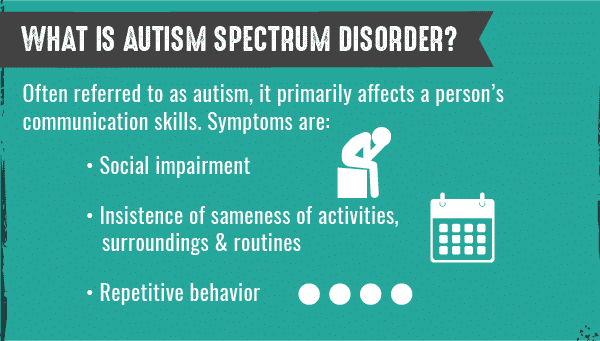
Autism vs. Asperger’s
Before 2013, different levels of impairment had different diagnoses. The most notable of these was Asperger’s syndrome. However, when The Diagnostic and Statistical Manual of Mental Disorders (DSM) was updated in 2013, all neurodevelopmental disorders were included as part of the autism spectrum. This change was, in part, to reduce confusion about diagnosing autism vs. Asperger’s syndrome. The diagnosis of Asperger’s syndrome was used for individuals with high-functioning autism.
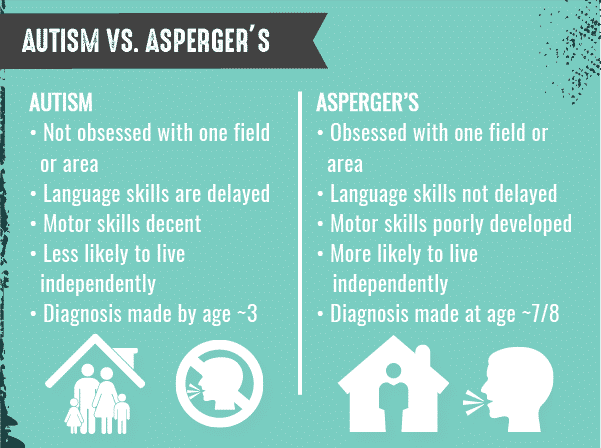
Symptoms of Autism
The three main categories of autism symptoms are:
[elementor-template id="4848"]- Social impairment and communication difficulties
- Insistence on the sameness of activities, surroundings and routines
- Repetitive behavior
People with autism often struggle with understanding social and non-verbal cues. Usual patterns of communication are not used, and many people with autism may prefer to be alone. In some cases, people are nonverbal their entire lives. Other people with autism may express themselves awkwardly or inappropriately. Some individuals with autism may repeat certain phrases over and over or only talk about their interests, utterly unaware of other people’s disinterest.
Many people who have autism struggle with change and transitions. These struggles usually manifest as feeling a need to adhere to a strict schedule and routine. Any deviation from the expected may cause severe discomfort and anxiety. Failure to adhere to a routine may cause angry outbursts. These outbursts may also occur if a person in a highly stimulating environment.
In the simplest form, repetitive behavior may manifest as simple body motions, such as rocking from side to side, wringing hands, or flapping arms. Repetitive behavior also refers to the development of specific interests. For example, many young children may like trains, but a child with autism may memorize the train schedules, only want to talk about trains and refuse to wear clothing that does not have a train design.
Autism Symptoms in Adults
Autism symptoms in adults may be difficult to recognize as some symptoms may appear to be caused by other disorders. For example, difficulty with social communication may be diagnosed associal phobiaor rocking back and forth in a chair may be diagnosed asattention deficit hyperactivity disorder. In most cases, adult diagnosis is most accurately made by a professional specializing in autism.
Autism Symptoms in Children
Autism symptoms in children are often easier to recognize as they are less likely to be overshadowed byother disorders. Most children diagnosed with autism are to a specialist by a pediatrician. Screening for autism spectrum disorders should be conducted for all children during well-child check-ups. Once referred to a specialist, a child will usually be assessed for their intelligence level, thinking abilities and communication skills. Other examinations such as blood testing and hearing testing may also be conducted to rule out other possible causes for behaviors.
What Causes Autism?
Scientists and medical professionals continue to question what causes autism and have found few solid answers. Most researchers believe that genes likely play a factor in the development of autism but specific genes that would cause this disorder have not been identified.
Genetics
Genetic factors of autism are likely the primary cause of this disorder. However, without being able to identify what genetic mutation would cause autism to develop, it can’t be called a genetic disorder. People diagnosed with other genetic conditions such as Down syndrome, fragile x syndrome and Rett syndrome are more likely also to be diagnosed with autism than the general population. This high rate of co-occurrence provides some validity to beliefs about autism being a genetic disorder.
Environmental Factors
While it is believed that autism is likely a genetic disorder, it is also thought that there are environmental factors affecting autism. However, specific autism environmental factors have not been identified. Former beliefs that parent style or vaccinations contributed to autism have been disproven.
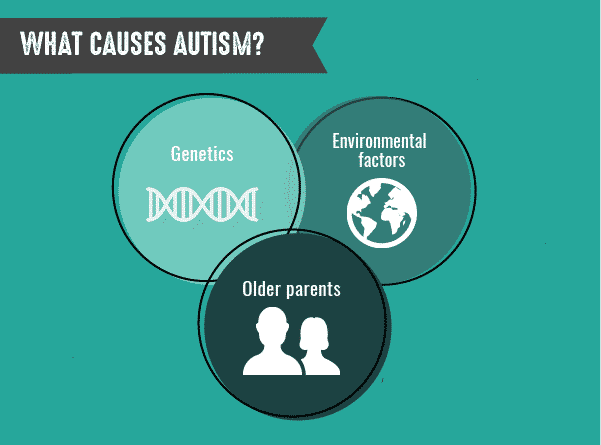
Diagnosing Autism
While not the only people who can diagnose autism, pediatric psychologists are medical professionals who most frequently diagnose autism. “When is autism diagnosed?” is a question often asked among parents. Diagnosis times can vary greatly. In children with more severe autism, it may be recognized in the first two years of life, while other children who have less noticeable impairment might go undiagnosed for much longer. Neurological, language and hearing testing should be conducted when diagnosing autism to rule out other possible disorders.
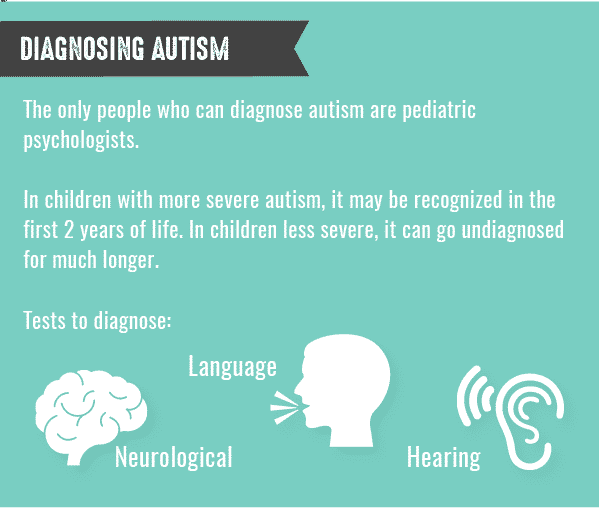
Who Is at Risk For Autism?
Due to knowing little about the exact cause of autism, there is no definite list of autism risk factors. What researchers do know is that autism seems to run in families. In addition to having a family member with autism, other possible autism risk factors include being born to older parents and having a low birth weight.
Autism Statistics
Autism diagnoses have become more common, likely due to the better understanding of the disorder by parents and increased screening. Autism statistics show that while white children historically have been diagnosed with autism at a higher rate than other races, this gap is now closing. This closing gap is not due to a difference in actual cases of autism, but likely due to underdiagnosing minority children.
Other autism statistics include:
- Boys arefour times more likelyto be diagnosed with autism than girls
- Nearly40 percentof people with autism do not speak at all
- Approximatelyone in 59 childrenis diagnosed with autism
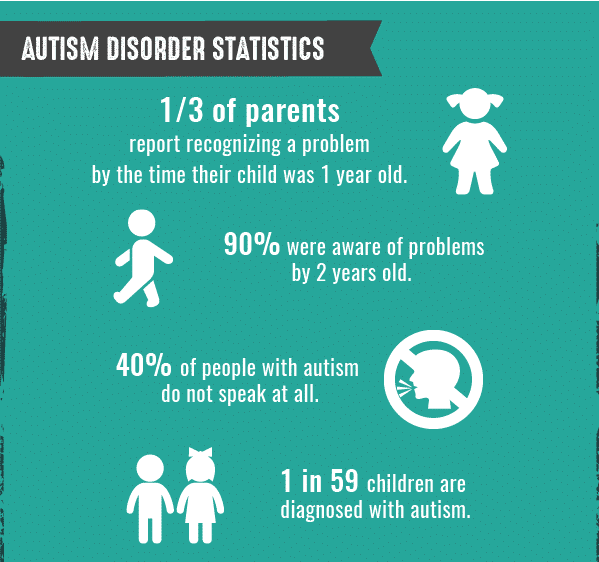
Autism and Substance Abuse
Autism and substance abuseare rarely treated concurrently. Due to symptoms of autism, such as being overly cautious and not social, it was previously assumed that people with autism would not have substance use disorders. In recent years, researchers have found this is not true.
Autism Spectrum Disorder Treatment
Autism spectrum disorder treatmentgenerally consists ofbehavioral therapy. This form of autism treatment assists in learning life skills, reducing negative behaviors and learning social skills. Medication may be prescribed as a part of autism treatment to relieve other related symptoms such as irritability, aggression, hyperactivity,anxietyordepression.
Treatment for individuals with autism spectrum disorder and a co-occurring substance use disorder can be difficult to find. The experts at The Recovery Village can provideindividualized treatment plansto meet this need. If you or a loved one might have a substance use problem,reach out to a representative todayto get more information on our program options.
